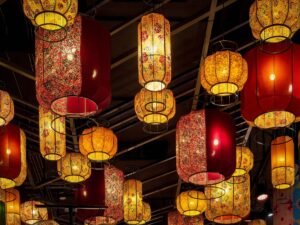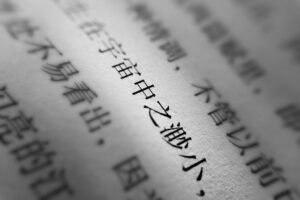It’s similar to putting the pieces of a challenging puzzle together to understand the syntax of any language. This is also true in the Chinese language, where it is crucial to use and comprehend time phrases like “today,” “yesterday,” and “tomorrow.” It improves comprehension and deepens conversational fluency to be aware of these time words and their grammatical conventions.
Table of Contents
ToggleToday, Yesterday, and Tomorrow in Chinese
The Mandarin language has its own set of time words because of its distinctive features and tonal nature:
- 今天 (jīntiān) means ‘today’.
- 昨天 (zuótiān) translates to ‘yesterday.’
- 明天 (míngtiān) represents ‘tomorrow’.
Each of these terms is made up of two characters, the first of which denotes the relative time (this, last, next), and the second of which, 天 (tiān), denotes the concept of a day. They are simple to recall due to their logical structure.
Grammar Rules
The usage of time terms in Chinese grammar is relatively simple. While they typically come at the start or conclusion of phrases for clarity, time words can exist anywhere in Chinese sentences, unlike in English.
Consider these examples:
- 今天我去公园。(Jīntiān wǒ qù gōngyuán.) – ‘Today, I am going to the park.’
- 我今天去公园。(Wǒ jīntiān qù gōngyuán.) – ‘I am going to the park today.’
- In both sentences, ‘today’ (jīntiān 今天) is used in different positions, but the overall meaning remains the same.
Contextual Usage
In Chinese, context is crucial for understanding. ‘Tomorrow’ (míngtiān 明天) can be used to refer to any day in the future, not only the day following today, for instance. The word “yesterday” (zuótiān 昨天) can refer to any day in the past. The context in which these words are employed frequently determines their precise meaning.
In addition to their literal meanings, these words may sometimes be used figuratively. For example, 明天 (míngtiān) may be used metaphorically to represent ‘the future,’ and 昨天 (zuótiān) can represent ‘the past.’

Expressing More Complex Time Concepts
Chinese also has expressions for ‘the day after tomorrow’ and ‘the day before yesterday.’ These are:
- 后天 (hòutiān) means ‘the day after tomorrow.’
- 前天 (qiántiān) translates to ‘the day before yesterday.’
Furthermore, for expressing concepts like ‘in two days’ or ‘three days ago,’ you would use the following structures:
- 两天后 (liǎng tiān hòu) – ‘in two days’
- 三天前 (sān tiān qián) – ‘three days ago’
Here, the number of days is placed before 天 (tiān), followed by 后 (hòu, meaning ‘after’) or 前 (qián, meaning ‘before’).
Conclusion
Chinese time expressions are sensible, adaptable, and situational. They offer a fascinating look at the structure and usage of the language and embody an intriguing feature of Chinese grammar. As we can see, understanding the finer points of Chinese syntax and cultural context is necessary to master the art of translating time phrases into Chinese. For learners to have a more thorough and immersive language experience, mastering these time words is a crucial first step towards being fluent in Chinese.
The flow of talks can be more clearly understood, and learners’ own ideas and plans can be more precisely expressed by paying attention to these temporal representations. Remember that knowing vocabulary and grammar alone won’t help you become fluent in a language; you also need to comprehend the cultural quirks and usage patterns that give a language its life and vigor. Understanding the art of time words is a crucial turning point on the joyful road of learning Chinese.
Continue your language learning journey with curiosity and patience, and soon, your understanding of Chinese will expand from ‘today’ (今天) through ‘yesterday’ (zuótiān 昨天) and into ‘tomorrow’ (míngtiān 明天) and beyond!
Contact our head teacher Chen Huimin at info@lcchineseschool.com if you are interested in learning Chinese or have additional questions about our Chinese programs.
REGISTER for our SUMMER CAMP in 2023!
Learn about our Internship Program in China.
Learn about holidays in China in 2023.
Get free Chinese learning resources.








